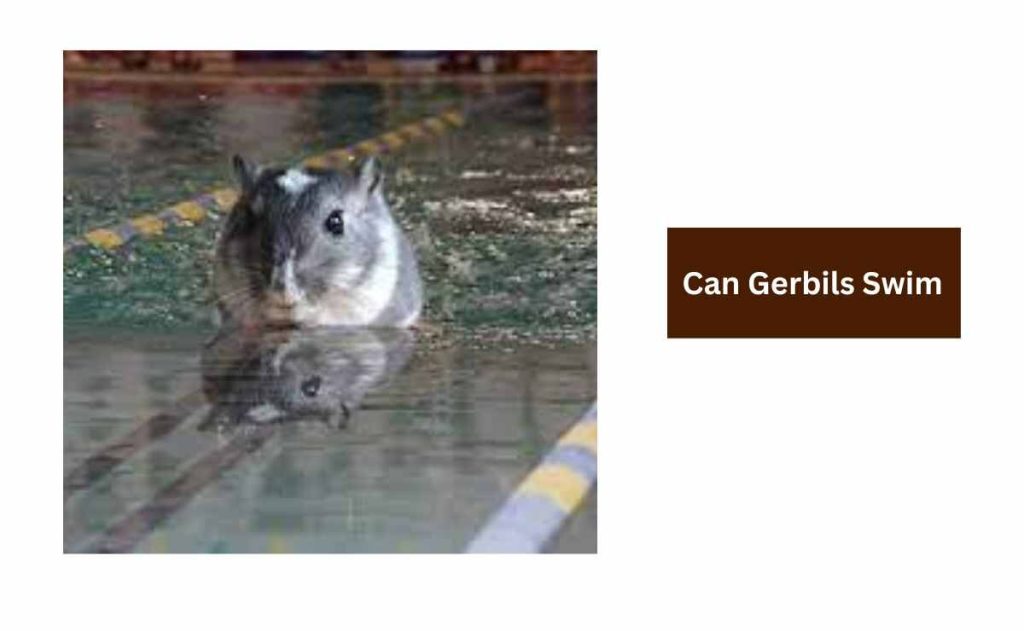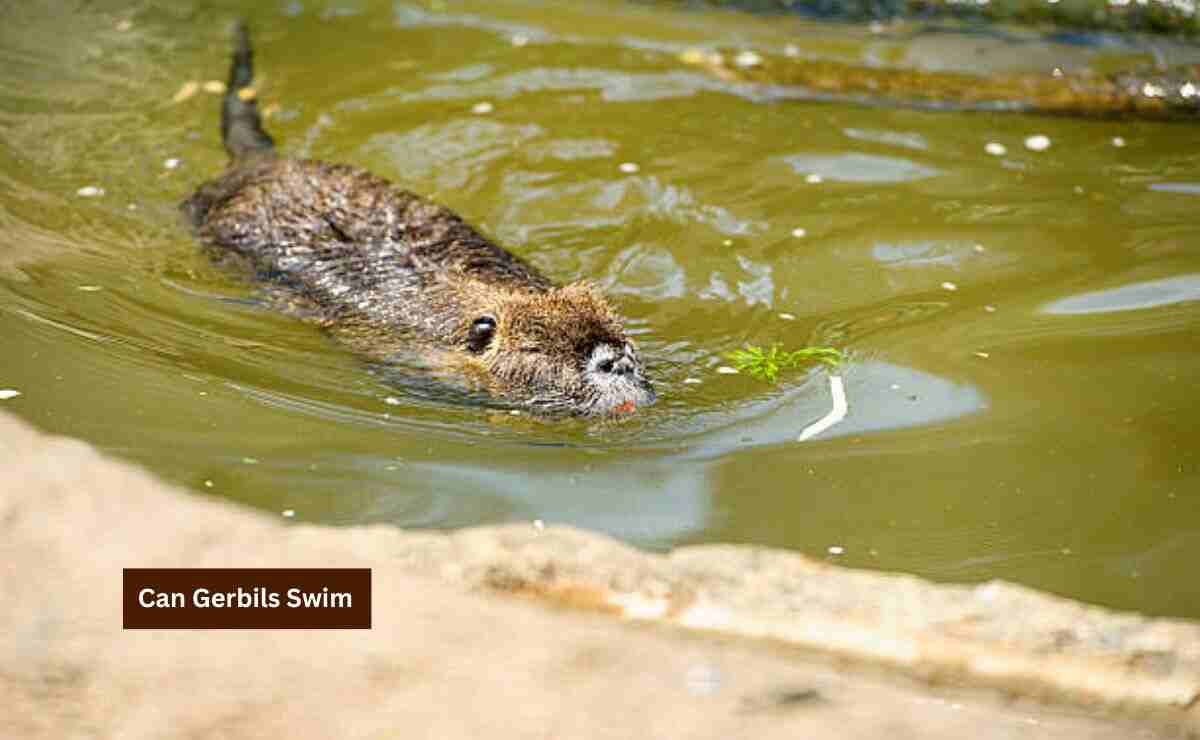Many rodent species are good swimmers; some pet owners ask can gerbils swim.
Gerbils can swim but if it’s a critical situation. In research, gerbils live a relatively dull life. They aren’t natural swimmers. In their natural habitat, there is a scarcity of water sources. So they aren’t required to swim.
Gerbils simply aren’t built for aquatic adventures. However, they can manage a doggy paddle if the situation turns desperate, gerbils don’t exactly relish the idea of a leisurely swim.
Can Gerbils Swim?

Gerbils are not natural swimmers and are not built for swimming. They do not have the same adaptations as aquatic animals, such as webbed feet or streamlined bodies. Gerbils have relatively short legs and a round, compact body shape, which makes swimming difficult for them.
While gerbils can technically paddle their legs and stay afloat for a short period of time, it is not a natural behavior for them. They are much more comfortable and agile on land, where they can use their powerful hind legs for jumping and running.
If a gerbil were to come into contact with water, it is likely that they would panic and become stressed. Their fur is not designed to repel water and would become waterlogged, making it difficult for them to stay afloat. Additionally, gerbils are not able to hold their breath for long periods of time, so prolonged exposure to water could be dangerous for them.
Do Gerbils Swim in The Wild?
Gerbils are small rodents that are native to desert-like environments, such as Mongolia and parts of Africa and Asia. In these arid habitats, water sources are scarce, and gerbils have adapted to survive without swimming.
Gerbils can indeed swim if circumstances lead them to water, but it’s a rarity rather than a regular occurrence. They are skilled diggers, burrowing through the sand to find food, create shelter, and escape predators.
Since gerbils are not naturally inclined to swim and are not built for it, it is rare to find them swimming in the wild. They have relatively short limbs and compact bodies, which are suited for their burrowing lifestyle rather than for swimming.
However, gerbils may exhibit different behaviors than those in the wild. Some pet gerbils may enjoy taking short dips in shallow water or splashing around in a small container and some are not interested in this act. In case of scarcity of water in the wild, gerbil can live without water for even few days.
That’s because gerbils stick closely to their home ranges, which are around their burrows. There’s no frequent need to head off and explore. So, while gerbils can swim in the wild, they rarely do.
Overall, gerbils are not known for their swimming abilities, and their natural habitats do not typically offer opportunities for them to swim. Their survival strategies primarily revolve around adapting to their arid environments and utilizing their impressive digging skills.
Is swimming in water stressful for gerbils?
As you know, gerbils can swim, but it’s not a pastime they willingly indulge in. In fact, swimming is the last resort for gerbils in conditions where they cannot find another way out. Although they may paddle if forced into the water, this experience induces stress that’s harmful to their health.
Gerbils with their short paws struggle in aquatic settings. Swimming for extended periods becomes physically challenging for them, and the risk of drowning looms large. In their native arid environments, water is a scarce commodity, and gerbils have evolved to thrive on minimal water intake.
Forcing gerbils into swimming situations not only causes immediate stress but can also lead to health issues if they remain in the water for too long. The stress they experience during forced swims is contrary to their natural instincts and habits. It disrupts their equilibrium and can have detrimental effects on their overall health.
Gerbil Swimming Studies and Controversies
Just like any mammal, gerbils can face the threat of drowning if they find themselves in water without an escape route. This danger arises in scenarios where they can’t swim out, such as being in the middle of a large body of water or during a flood.
In their natural habitats, gerbils rarely face such situations that could lead to drowning. The semi-arid landscapes they inhabit lack substantial bodies of water, and their cautious nature keeps them firmly on land.
Speaking of baths gerbils, unlike some other pets, don’t exactly revel in the joy of swimming. They know well about their ability to swim and it’s not a recreational activity for them. So gerbils exhibit signs of discomfort when in water. They instinctively seek a solid surface, attempting to escape the water rather than enjoying a leisurely swim.
Moreover, the forced swim tests conducted on gerbils reveal that prolonged exposure to water induces stress and unhappiness. Their aversion to swimming is driven by both fear and an absence of water-related challenges in their natural habitat.
Why Gerbils Don’t Like Water?
In their semi-arid habitats, large sources of water are a rarity, and even when present, gerbils are more inclined to approach them for a drink rather than a swim.
The main reason is gerbils have short legs and a lack of natural adaptation to water. Swimming into water poses a significant risk, making them vulnerable to predators that lurk in aquatic environments. In their natural habitat, survival instincts guide gerbils away from playful splashes.
However, survival can sometimes demand unexpected actions. In dire circumstances, when food is scarce or conditions become unbearable, gerbils may reluctantly take to the water as a last resort. Despite their dislike of aquatic excursions, these small mammals are pragmatic enough to swim when the situation calls for it, demonstrating their adaptability.
You must remember that gerbils live in semi-arid habitats, and such places do not typically have large masses of water. Even when they live in an area with rivers, springs or lakes, gerbils are unlikely to venture into the water. They only pay a visit to such water when they need to have a drink.
Can You Give Your Gerbils Water Bath?
Though gerbils don’t enjoy swimming or don’t like water, this doesn’t mean you can’t give your gerbil a proper cleaning. If you opt for a water bath, you can give it.
Yet, the wiser choice is that gerbils are adept at self-grooming like many other pets. Their tongues and teeth come into play as they meticulously clean their fur, reaching even the trickiest spots like the back of the head. Also, gerbils engage in communal grooming, helping each other in the pursuit of cleanliness.
While frequent water baths aren’t a staple in a gerbil’s grooming routine, there are situations where a bath becomes a necessity. If your gerbil is grappling with fleas or mites, an occasional bath with anti-parasite shampoo could be the solution. These shampoos contain chemicals designed to eliminate parasites, providing relief for your gerbils.
However, you have to ensure that the bathing experience is stress-free for your gerbil. The water level should be shallow enough for your pet to comfortably raise its head above the water, avoiding the need for swimming. In general, don’t harbor an aversion to such baths when done thoughtfully.
in the wild, gerbils used to dust baths, so providing them with this familiar option ensures both cleanliness and a happy gerbil. Instead of water, gerbils revel in rolling around in sand, a process that helps absorb oils and grease from their fur.
This not only offers an effective cleaning method but also mimics their natural habitat in Mongolia, where dust baths are a common practice.
Conclusion
Gerbils have swimming ability in the instinctive moments. But, it is totally not recommended to put a gerbil in water or expect them to swim.
It is always best to provide them with a safe and comfortable environment on land, with plenty of opportunities for exercise and exploration.
